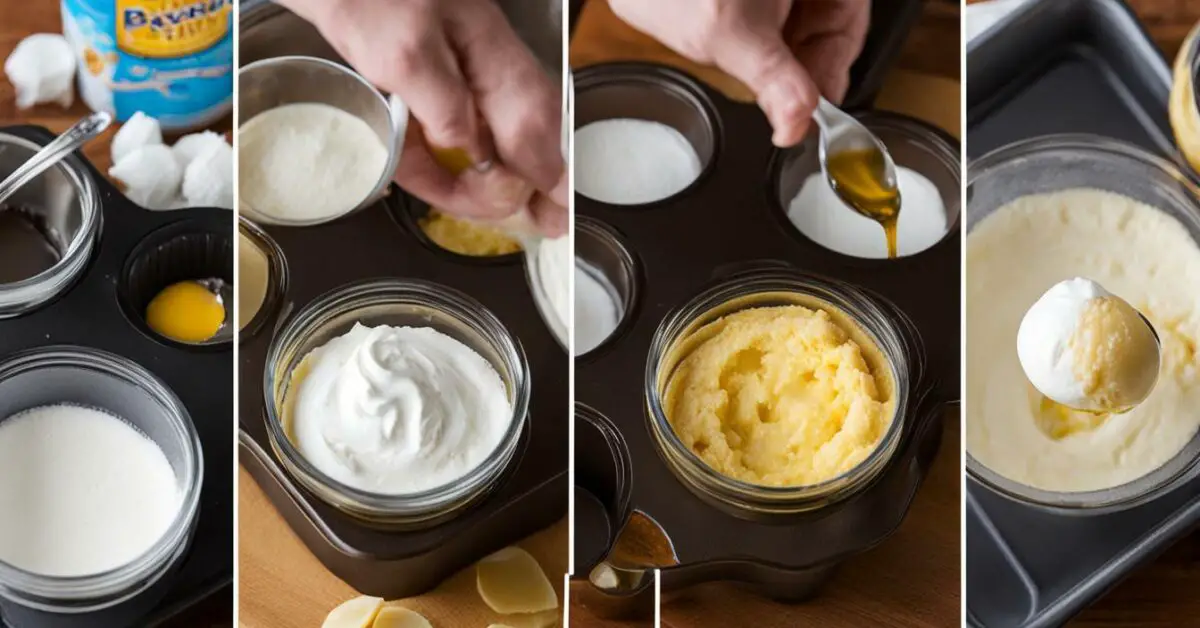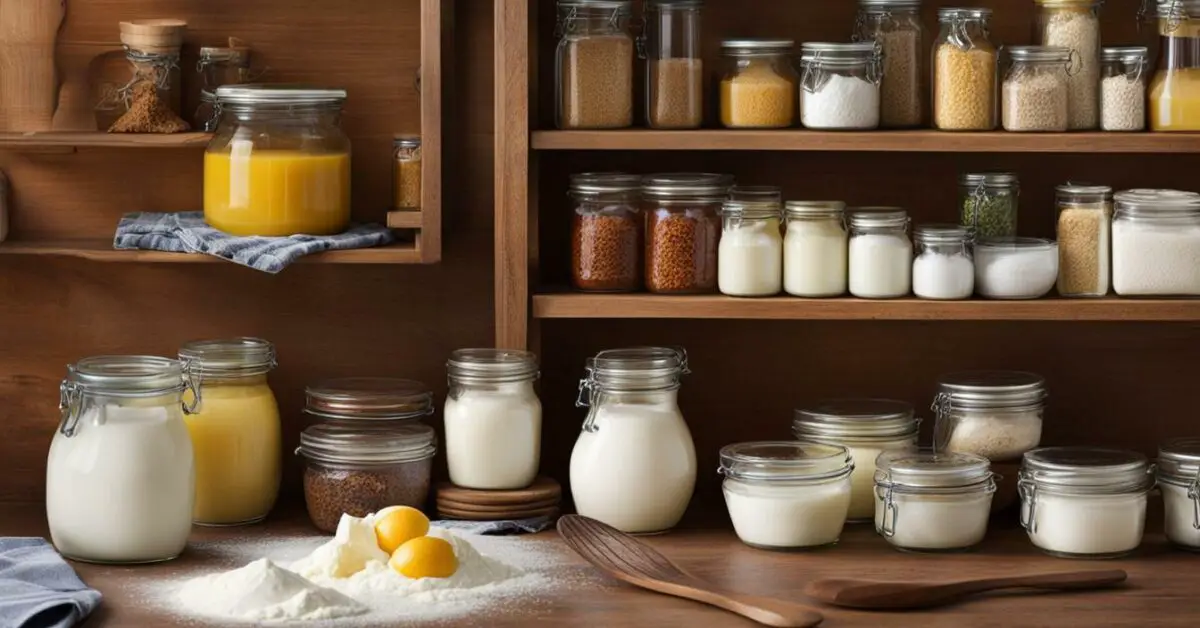
This post may contain affiliate links. Please read my disclosure for more information.
Running out of baking powder doesn’t mean you have to put your cookie baking on hold – discover these 7 incredible substitutes that will save the day.
Key Takeaways:
- When you run out of baking powder, you can use baking soda and cream of tartar as a substitute.
- Mixing lemon juice and baking soda can create a light and fluffy texture in your cookies.
- Using buttermilk and baking soda together adds moisture and leavening properties to the dough.
- Molasses, yogurt, vinegar, and club soda are unique alternatives that help with the leavening process.
- If you have self-rising flour, you can use it as a convenient substitute for regular flour in your cookie recipe.
Baking Soda and Cream of Tartar
Mix 1/4 teaspoon of baking soda with 1/2 teaspoon of cream of tartar to create a simple and effective substitute for baking powder in your cookies. This combination of ingredients can provide the leavening effect needed for your delicious homemade treats.
Baking soda is an alkaline compound that reacts with acidic ingredients like cream of tartar to release carbon dioxide gas, which helps the cookies rise during baking. Cream of tartar, also known as tartaric acid, acts as the acidic component in this substitute and adds tanginess to the flavor profile.
To use this substitute, simply combine the baking soda and cream of tartar and add them to your dry ingredients. Make sure to incorporate the mixture evenly to ensure proper leavening throughout the dough. Follow your cookie recipe as usual, adjusting other ingredients and baking times as necessary. Enjoy your cookies with a light and fluffy texture!
| Ingredients | Measurement |
|---|---|
| Baking soda | 1/4 teaspoon |
| Cream of tartar | 1/2 teaspoon |
Lemon Juice and Baking Soda
When you run out of baking powder and need a substitute for your cookies, one option is to combine 1/2 teaspoon of lemon juice with 1/4 teaspoon of baking soda. This mixture can help you achieve the same leavening effect as baking powder, resulting in light and fluffy cookies.
In addition to providing a leavening effect, the combination of lemon juice and baking soda adds a subtle tangy flavor to your cookies. It can enhance the overall taste and make your baked goods even more delicious.
To use lemon juice and baking soda as a substitute for baking powder, simply mix them together and add the mixture to your cookie dough. Remember to adjust the other ingredients in your recipe accordingly to maintain the right balance of flavors and ensure the desired texture.
| Ingredients | Quantity |
|---|---|
| Lemon juice | 1/2 teaspoon |
| Baking soda | 1/4 teaspoon |
By using lemon juice and baking soda, you can successfully substitute for baking powder in your cookie recipes, ensuring you can still enjoy freshly baked treats even when you’re out of one key ingredient.
Buttermilk and Baking Soda
Add an extra 1/4 teaspoon of baking soda to the dry ingredients and 1/2 cup of buttermilk to the wet ingredients for a delicious substitute for baking powder in your cookies. Buttermilk not only adds moisture to your dough but also helps with the leavening process, resulting in tender and flavorful cookies.
When using buttermilk as a substitute for baking powder in cookies, it’s important to adjust the recipe slightly. The extra baking soda compensates for the absence of baking powder, providing the necessary leavening effect. The buttermilk adds a tangy flavor and helps create a soft and moist texture.
To use buttermilk and baking soda as a substitute, simply add the extra baking soda to the dry ingredients and pour the buttermilk into the wet ingredients. Incorporate the dry and wet ingredients as directed in your cookie recipe, and enjoy the delightful taste and texture of your homemade cookies.
| Buttermilk and Baking Soda Substitute for Baking Powder in Cookies | |
|---|---|
| 1/4 teaspoon baking soda | Extra amount to compensate for the absence of baking powder |
| 1/2 cup buttermilk | Adds moisture and tangy flavor |
Molasses, Yogurt, Vinegar, and Club Soda
Get creative in the kitchen by experimenting with molasses, yogurt, vinegar, or club soda as alternatives to baking powder in your cookie dough. These ingredients can add unique flavors and textures to your cookies while providing the leavening effect needed for a perfect bake.
Molasses, a thick and sweet syrup, can help give your cookies a rich and deep flavor. To use molasses as a substitute for baking powder, replace 1 teaspoon of baking powder with 1/4 cup of molasses. Keep in mind that molasses has a strong taste, so it’s best to pair it with cookies that can handle the robust flavor, like gingerbread cookies.
Yogurt is another versatile ingredient that can be used as a substitute for baking powder in cookies. The acidity in yogurt reacts with baking soda to create carbon dioxide, resulting in a slight lift in the dough. For every 1 teaspoon of baking powder, you can use 1/2 cup of plain yogurt. Remember to adjust the other wet ingredients in your recipe to maintain the desired consistency.
Vinegar, particularly white vinegar or apple cider vinegar, can also be used as a leavening agent in cookies. When combined with baking soda, the acid in the vinegar creates a chemical reaction that helps the dough rise. For every 1 teaspoon of baking powder, substitute it with 1 teaspoon of vinegar and add an additional 1/2 teaspoon of baking soda. Be prepared for a slight tangy flavor in your cookies.
| Substitute | Measurement |
|---|---|
| Molasses | 1/4 cup |
| Yogurt | 1/2 cup |
| Vinegar | 1 teaspoon |
| Club Soda | 1/2 cup |
Club soda, a carbonated water, can also be used as an alternative to baking powder. Its bubbles help create a light, airy texture in cookies. Replace 1 teaspoon of baking powder with 1/2 cup of club soda to achieve the desired leavening effect.
Remember to take note of the additional ingredients needed when using these substitutes, as they may affect the overall taste and texture of your cookies. Get creative in the kitchen and enjoy experimenting with these alternatives to baking powder in your cookie recipes!
Self-Rising Flour
Don’t worry if you don’t have baking powder – simply replace regular flour with self-rising flour and enjoy the same leavening effect in your cookies. Self-rising flour is a versatile ingredient that already contains baking powder, making it a convenient substitute.
To use self-rising flour as a substitute, simply swap it for regular flour in your cookie recipe. Since self-rising flour already contains baking powder, there’s no need to add any additional leavening agents. Just be sure to adjust the amount of salt in your recipe, as self-rising flour already contains salt.
Self-rising flour is a popular choice for biscuits and quick breads, but it can also work wonders in your cookie recipes. Its leavening properties help create a light and fluffy texture, resulting in delicious cookies that rise beautifully.
| Ingredient | Measurement |
|---|---|
| Self-Rising Flour | 1 cup |
By using self-rising flour as a substitute for baking powder in your cookies, you can still achieve the desired lift and texture without compromising on taste. So go ahead and give it a try next time you find yourself out of baking powder.
Conclusion
With these 7 substitute options, you can confidently continue baking cookies even when you run out of baking powder. When faced with a baking powder shortage, try mixing 1/4 teaspoon of baking soda with 1/2 teaspoon of cream of tartar. This combination will provide the necessary leavening effect for your cookies, ensuring they rise and have a light texture.
If you don’t have cream of tartar on hand, another alternative is to combine 1/2 teaspoon of lemon juice with 1/4 teaspoon of baking soda. The acidity of the lemon juice reacts with the baking soda, creating carbon dioxide bubbles that help the dough rise. This substitution will give your cookies a slight tangy flavor.
Using buttermilk and baking soda together is also a great option. Simply add an extra 1/4 teaspoon of baking soda to the dry ingredients and 1/2 cup of buttermilk to the wet ingredients. The acidity in the buttermilk activates the baking soda, resulting in cookies that are moist and have a delightful texture.
If you’re looking for more unique alternatives, consider using molasses, yogurt, vinegar, or club soda. Each of these ingredients brings its own unique properties to the table, helping with the leavening process and adding interesting flavors to your cookies.
Finally, if you happen to have self-rising flour on hand, it can be used as a convenient substitute for regular flour in your cookie recipe. Self-rising flour already contains baking powder, so it eliminates the need for any additional leavening agents.
So don’t let a lack of baking powder hold you back from indulging in homemade cookies. With these 7 substitute options, you can still enjoy fresh-baked treats anytime!
FAQ
What can I use as a substitute for baking powder in cookies?
When you run out of baking powder, you can try several alternatives such as baking soda and cream of tartar, lemon juice and baking soda, buttermilk and baking soda, molasses, yogurt, vinegar, club soda, or even self-rising flour.
How do I substitute baking soda and cream of tartar for baking powder in cookies?
To create a baking powder substitute, mix 1/4 teaspoon of baking soda with 1/2 teaspoon of cream of tartar.
Can I use lemon juice and baking soda to replace baking powder in cookies?
Yes, you can combine 1/2 teaspoon of lemon juice with 1/4 teaspoon of baking soda to create a substitute for baking powder in cookies.
What is the alternative to baking powder in cookies using buttermilk?
To substitute for baking powder using buttermilk, add an extra 1/4 teaspoon of baking soda to the dry ingredients and 1/2 cup of buttermilk to the wet ingredients.
What other ingredients can I use as a substitute for baking powder in cookies?
Besides baking soda and cream of tartar, lemon juice and baking soda, and buttermilk and baking soda, you can also use molasses, yogurt, vinegar, or club soda as alternatives for baking powder in cookie recipes.
Can I replace baking powder with self-rising flour in cookies?
Yes, if you have self-rising flour, you can use it as a substitute for regular flour in your cookie recipe. Self-rising flour already contains baking powder.


